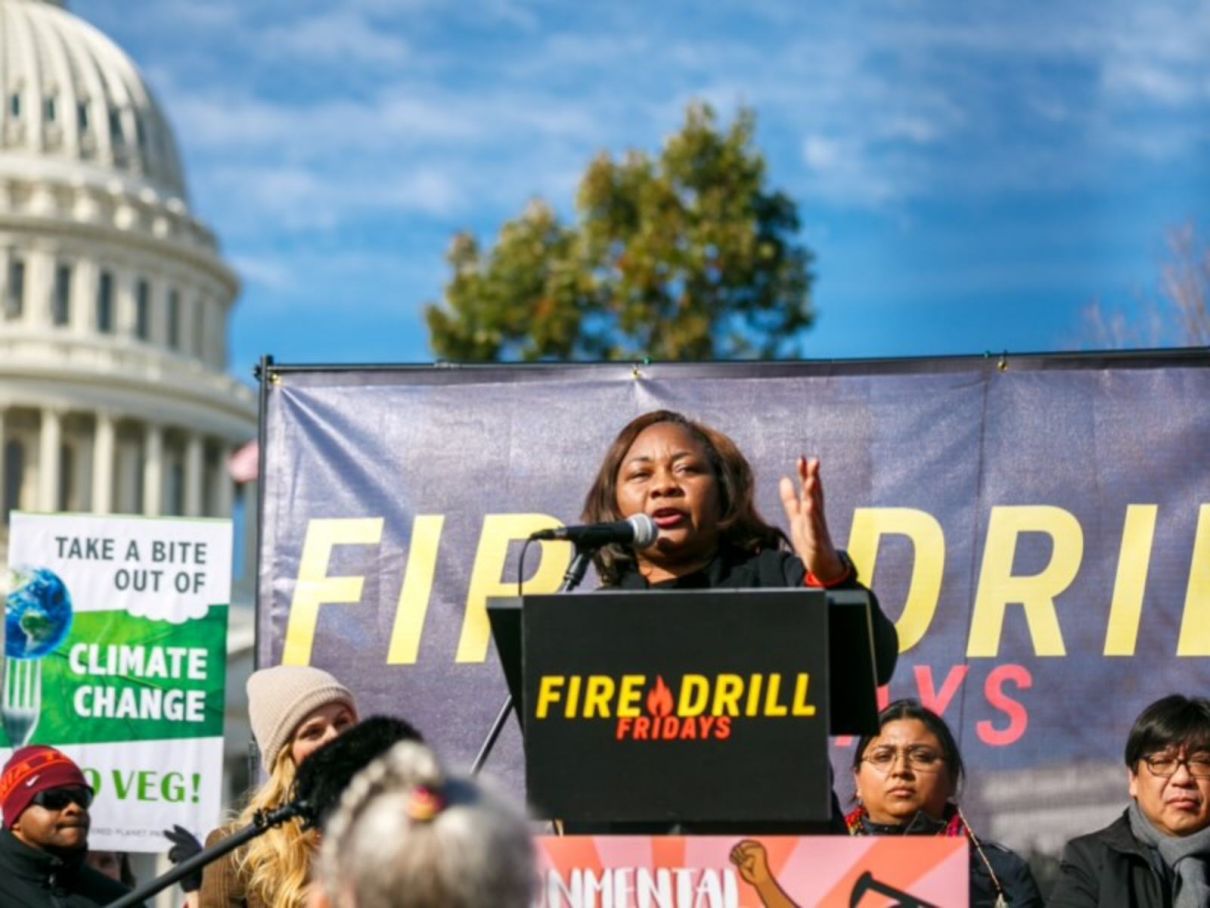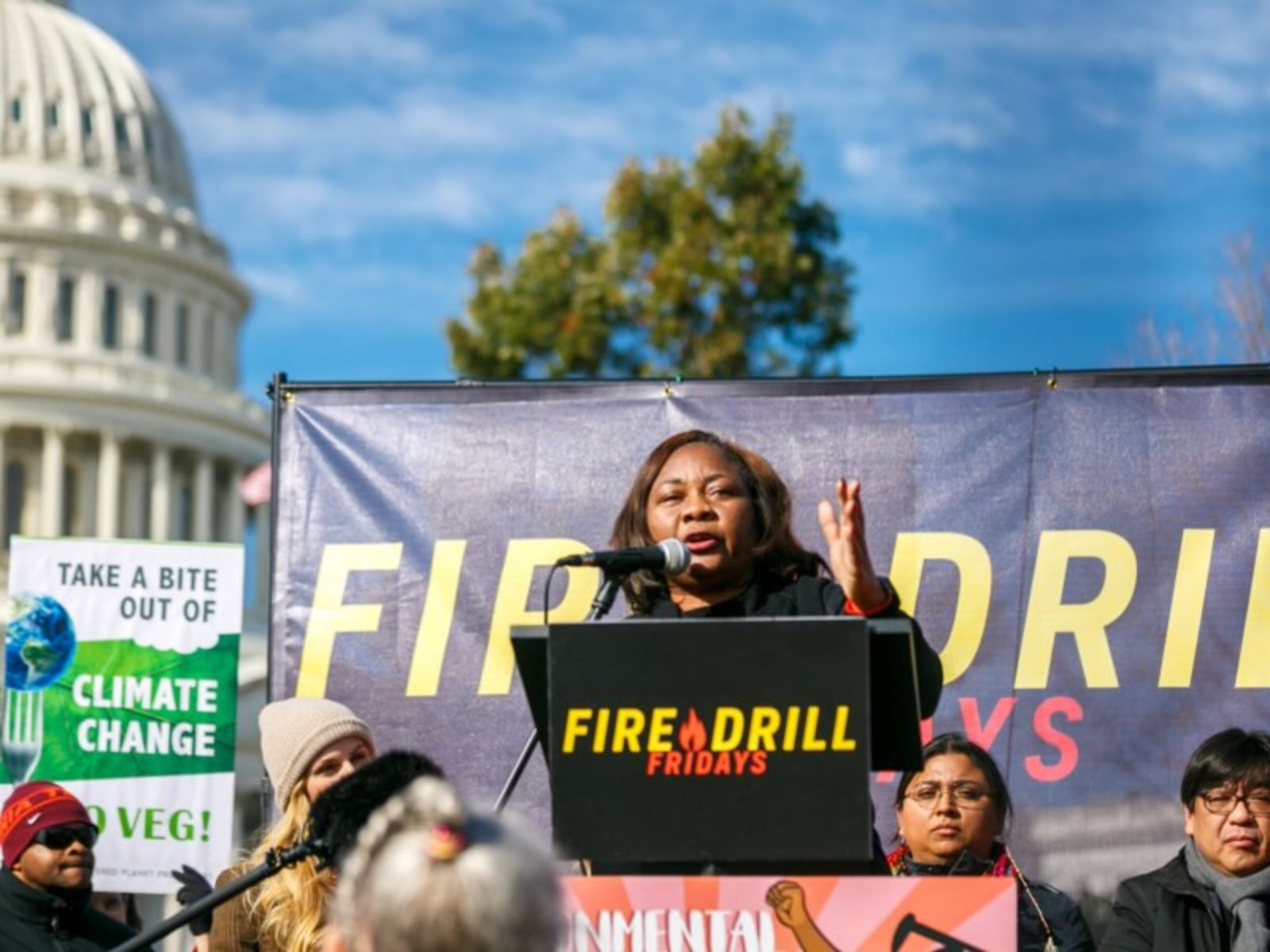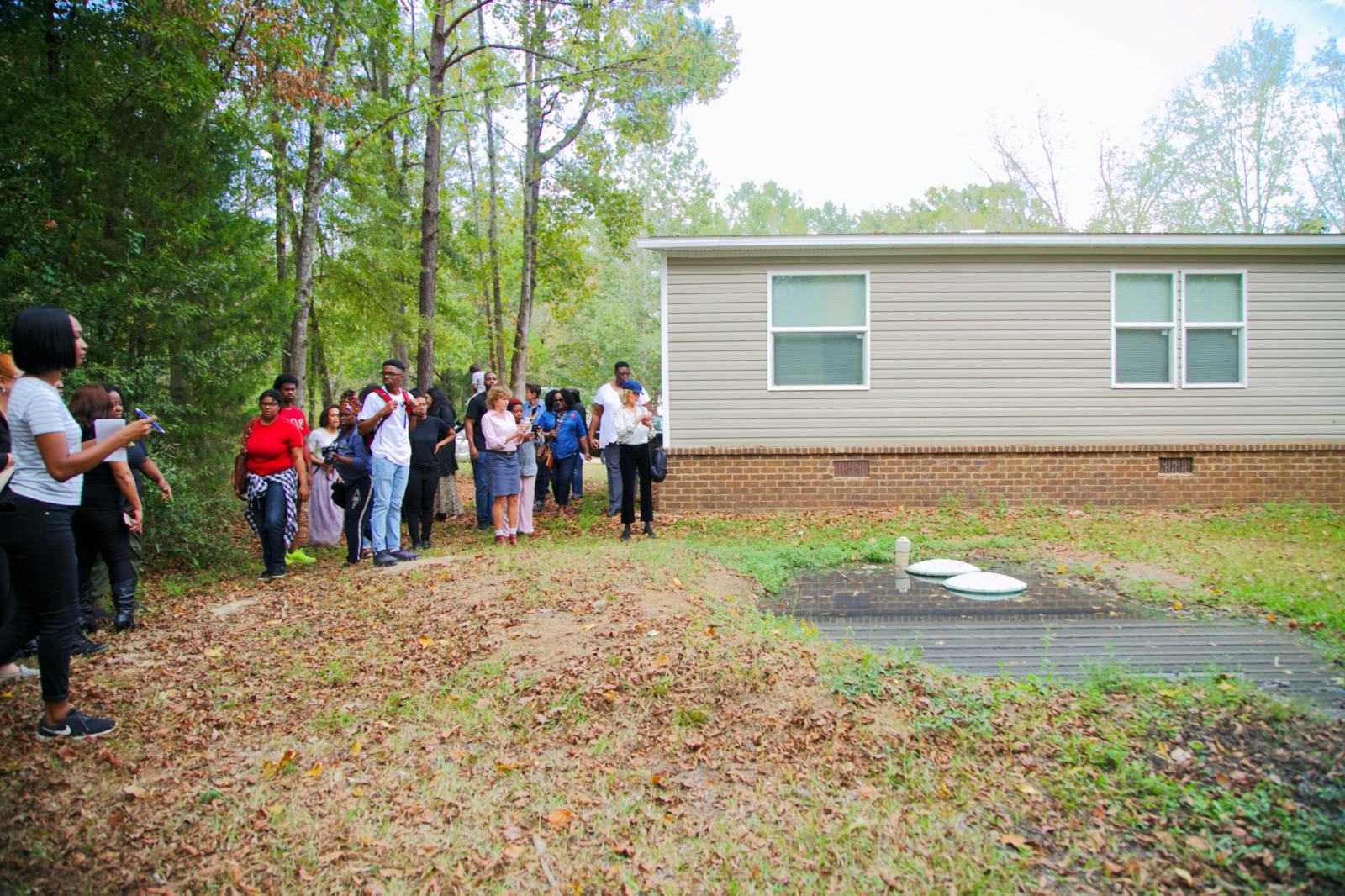Achieving Environmental Justice

The climate crisis disproportionately affects the poorest communities. One woman has shone a light on the ugliest of secrets.

It seems fitting that as I begin a Zoom call with Catherine Flowers, a member of the Biden/Sanders Unity Task Force on Climate Change, she has to raise her voice to be heard against a backdrop of thunder and lightning crashing outside her window.
Alabama, her home, has had some crazy weather patterns recently, including a severe tornado that ripped through Birmingham in January. She has just been messaging friends in Texas who are suffering from power outages and drinking-water shortages due to the deadly winter storm that has left millions struggling.
“We can’t ignore it anymore, it’s here,” she says, laughing sadly. She is, of course, talking about climate change. And Flowers has dedicated her life to a specific part of climate change, that of environmental justice.
Environmental justice, she explains, is the fight against the intertwined crises of racism, poverty and climate change that she believes have risen to epidemic proportions in rural areas in the US. Flowers spends much of her time educating people about rural poverty and environmental injustice; how poor people are trapped in conditions no one else would put up with around the US. Those conditions — polluted air, tainted water, untreated sewage — are making people sick, in some cases killing them. Climate change is making those conditions worse and now they are starting to afflict people who aren’t used to that kind of misery.

For example, she has exposed the atrocious conditions caused by lack of proper sanitation infrastructure for the rural poor in the US; how they live in squalor, next door to pools of raw excrement, which has recently been tested to show hookworm and other parasites making a comeback. Record floods and heavy rain means already-ineffective sewage systems burst and turn into cesspools outside where children play.
After two decades of activism, her voice is finally being heard. In November 2020 Flowers published her book WASTE: One Woman’s Fight Against America’s Dirty Secret, in which she explains how inadequate disposal systems for human waste not only subject many Americans to disgusting living conditions that have resulted in the reappearance of once-vanquished diseases and parasites, but also work to keep them poor and criminalise poverty by subjecting them to fines, arrests, and even imprisonment.
Flowers also describes recent progress made in drawing attention to this issue, and the concrete steps that can and should be taken to remedy it.
Also last year she was awarded the MacArthur Fellowship, a prize of US$625,000 known as “the genius grant”, for US individuals who show “extraordinary originality and dedication in their creative pursuits and a marked capacity for self-direction”. In 2019 she was elected to the Biden/Sanders Unity Task Force in Climate Change, a seven-strong membership chaired by John Kerry and Alexandria Ocasio-Cortez.

Flowers is also the founder and director of the Center for Rural Enterprise and Environmental Justice in Alabama. In addition, she is the rural development manager at the Race and Poverty Initiative of the Equal Justice Initiative founded by Bryan Stevenson, which was made famous by his bestselling book Just Mercyand the Hollywood movie of the same name.
Now is her time, and now is her president. Joe Biden, a long-time climate-change champion, was making good on his promise to spend US$1.7 trillion on climate-change issues on his first day in office. One sweeping directive he signed calls for stronger action to protect public health and the environment, and hold polluters accountable, including those who “disproportionately harm communities of colour and low-income communities”.
Biden appointed Michael Regan to head the US Environmental Protection Agency (EPA), the first black man to serve as EPA administrator in the agency’s history. His appointment suggests that the agency will make environmental justice an absolute priority.

Back to our Zoom conversation. Flowers is describing the moment of horror that first led her to shine a light on the reality of life for millions of rural poor, living amid filth.
Born and raised in Lowndes County, Alabama, a cradle of the Civil Rights Movement, which contains most of the route of the famous Selma to Montgomery March of 1965 led by Martin Luther King, activism runs in her blood. Indeed, at the age of 15 she taught herself local law and had an inept teacher removed from her school. Flowers then led a successful campaign to change the name of her high school so that it no longer honoured a Confederate slave owner.
She studied, got an MA in history, became a teacher working in Washington, DC, North Carolina, and Detroit, but kept feeling the pull of her roots back to Alabama. “My parents were still here and so were my ancestors. I sense their blood and sweat in this fertile soil.” So, in 2001 she became a consultant in economic development for Lowndes County. Flowers was alerted to a family in trouble — the McMeans — whom she went to visit. Their septic system wasn’t working and they’d been threatened with eviction and arrest because of the raw sewage flowing from their home. The cost of fixing it was far beyond what they could ever afford.
As Flowers approached, she saw a compound of five white trailers and a small country church. The homes were on an incline and she was shocked to see raw sewage streaming alongside the sloping road. The pastor of the church and Mr McMeans explained their predicament, both crying. “It was heart-breaking,” she says. After an article was published about the issue, donations began pouring in and the McMeans were out of immediate jeopardy.
Shockingly, an estimated 90 percent of Lowndes households have failing or inadequate wastewater systems. Thanks to research efforts sparked by Flowers, a study revealed in 2017 that more than 30 percent of the county’s residents had hookworms, an insidious health menace that had long been thought eradicated in the US.

A septic system to correct these conditions can cost up to US$30,000, more than a year’s wages for many of the working poor. The problem happens mostly in rural areas, but even people in poor urban neighbourhoods who pay for municipal sewage service often find that it is inadequate, and they are penalised in the same way as their rural cousins.
“This shouldn’t happen in 21st century America. Yet it does. Too many Americans live without any affordable means of cleanly disposing of the waste from their toilets and must live with the resulting filth,” Flowers writes in her book.
Flowers began to see that the problem was national, affecting people in places from rural southern Illinois and Kentucky to unincorporated Latinx neighbourhoods in California, Native American reservations in the West, and communities in Alaska, Hawaii and Puerto Rico. Nationwide, Flowers asserts, the problem has been ignored by policymakers on all levels. Local, state, and federal governments fail to invest in rural infrastructure. They fail to protect poor consumers from buying and installing shoddy equipment pitched by unscrupulous contractors. And they fail to encourage the development of new technology that might provide long-term, affordable, solutions.
As Flowers points out, the problem of inadequate human-waste disposal in the US has now become too big to ignore. Climate change, with its rising sea levels and heavy rains that saturate soil, threatens to bring sewage to more backyards, and not only those of poor minorities. In Florida, for example, a study found that 64 percent of Miami-Dade County septic systems could malfunction by 2040, threatening water supplies.
It’s a crisis that is finally getting some attention. Thanks to Flowers, politicians such as Bernie Sanders and Alabama Senator Doug Jones, famous activists such as Reverend Dr William Barber of the Poor People’s Campaign, and many others, have travelled to Lowndes County to witness the conditions.
Now Flowers is working on finding an innovative system to treat waste so it doesn’t become a problem. She is putting the money from her grant towards contractors who could work on these technologies and has contacted NASA for its help. She has organised a nationwide survey in partnership with The Guardian newspaper to better understand the scale of the problem, to be able to put a price on fixing it (she believes it will be billions) and is hoping to engage Facebook or Google to assist with the survey.
Flowers is seeking help from philanthropists or impact investors. “We need to fix this now or else we will face contaminated drinking water, fish supplies killed, diseases spread, and so on.” She points to recent research showing that SARS-CoV-2 virus can survive for some time in water or sewage. “I believe if we don’t find a solution, the next epidemic will come from here.”
“I want to show as many people as I can what this crisis looks like, feels like, and smells like. I call it America’s dirty secret, and I’m bringing it out in the open.”
This article originally appeared in Billionaire's Hope issue, Spring 2021. To subscribe contact









